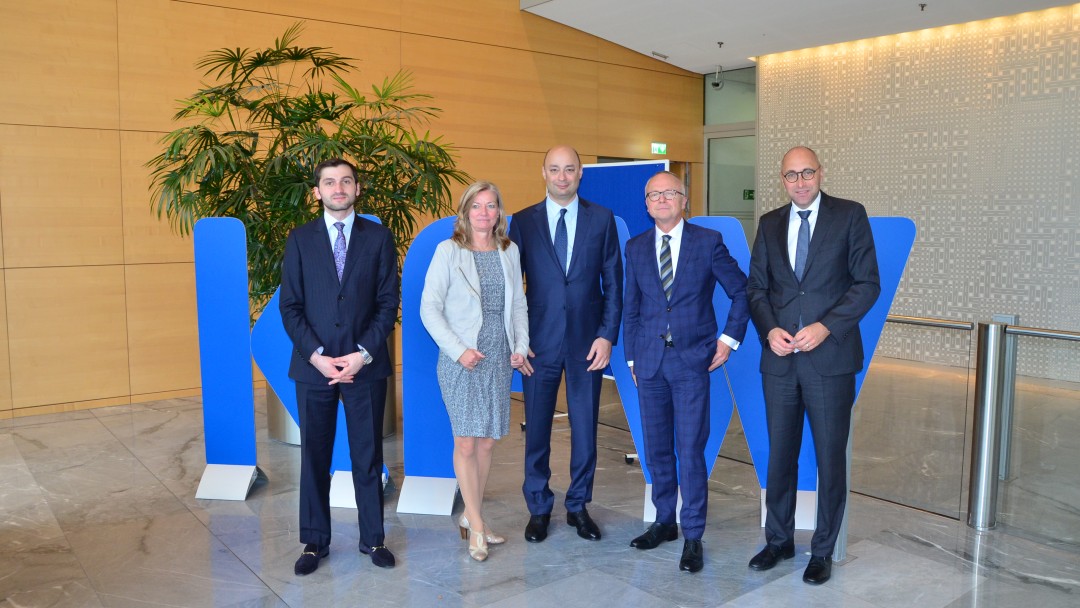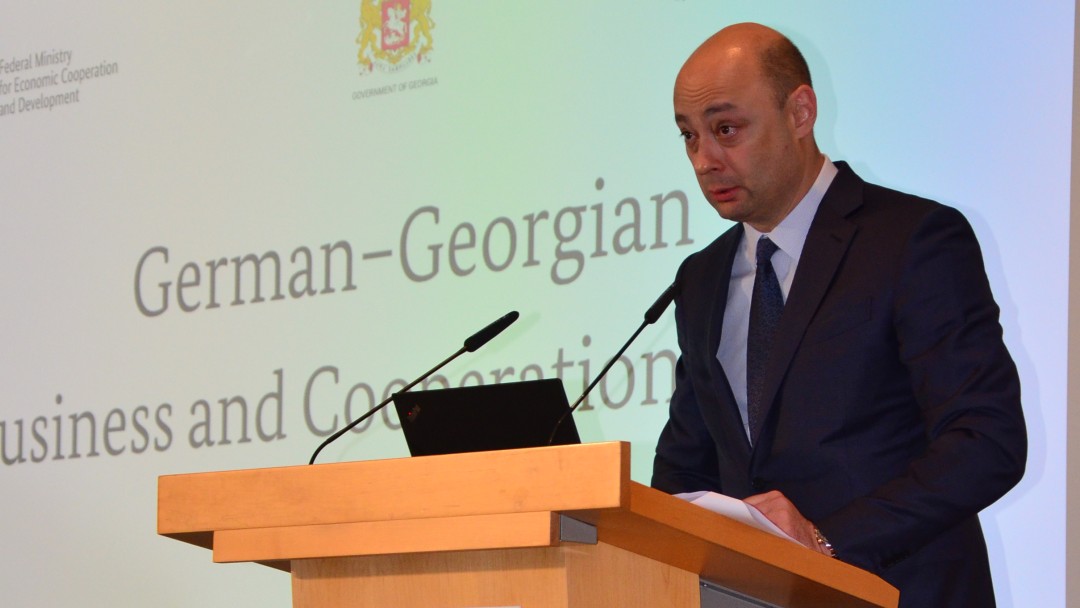News from 2018-10-15 / KfW Development Bank
KfW hosts German-Georgian Business and Cooperation Forum

Germany and Georgia – two countries that can look back on over 25 years of close relations. And two countries with quite special ties. For when the small nation in the Caucasus became independent in 1991, Germany was the first country to recognise Georgia under international law. As the Frankfurt Book Fair’s guest country, Georgia has been receiving attention from the German public over the last few days. This comes as a welcome opportunity to appreciate both Georgia’s cultural diversity and its economic progress in recent years, as well as to highlight the great potential the country offers for future cooperation projects.
This was the reason behind the German-Georgian Business and Cooperation Forum, which KfW Group hosted at its premises in Frankfurt for the first time at the invitation of the German Federal Ministry for Economic Cooperation and Development (BMZ). Many attendees were invited from the worlds of politics and business, as well as from promotional and consulting institutions in both countries. Christiane Laibach (Chair of the Management Board of DEG – Deutsche Investitions- und Entwicklungsgesellschaft) and Norbert Barthle (Parliamentary State Secretary in the BMZ) addressed the audience to welcome their guests, who included Giorgi Kobulia (Georgian Minister of Economy and Sustainable Development), Bernardo Calzadilla-Sarmiento (UNIDO Director), and many representatives from Georgian and German companies. The event was chaired by Ute Klamert, Regional Director of the Europe, Mediterranean and Central Asia Department at GIZ (Deutsche Gesellschaft für Internationale Zusammenarbeit).
Christiane Laibach stated that both countries are united in their shared goal of sustainable development, which starts with the expansion of infrastructure, education and support for the private sector. The Georgian government has achieved a great deal in these areas in recent years, she added. Based on Chancellor Merkel’s visit to Georgia this August, State Secretary Barthle underlined the German Federal Government’s desire to support lively economic exchange between the two countries to further promote Georgia’s positive development. Georgian Minister Giorgi Kobulia, who was chief partner at consulting company McKinsey in Moscow before entering office in July 2018, pointed to encouraging general economic conditions. He explained that Georgia has achieved economic growth of 3.5% on average over the last three years, significantly more than its neighbouring countries. The International Monetary Fund has acknowledged the country’s good results and issued a growth forecast of 5.5% for 2020-2023, the highest in the region – and although the country has not yet reached an investment grade among the rating agencies, the outlook is positive, Kobulia argued. The minister added that many reform projects have been implemented with support from KfW and GIZ, with important legal reforms to retirement benefits and reforms to facilitate private investment in the public sector in preparation or set to take effect at the start of the year. Mikheil Khidureli from the public consulting agency Enterprise Georgia made the case for Georgia as an ideal springboard for German companies looking to do business in Asia. He further stated that the country offers great advantages by way of other local factors, such as stability, security, taxes, regulation, production costs and energy supply.

Michael Hampel from HeidelbergCement Caucasus Ltd and Matthias Müller from Bertelsmann subsidiary Arvato took stock from the perspective of their companies, which have set up branches in Georgia. As well as mentioning the support from the government, which is always receptive to engaging with investors’ concerns, the pair especially praised their Georgian staff’s levels of motivation, along with their professional skills and qualifications. The Georgians’ broad-based language skills are beneficial for establishing a foothold in other markets, they explained.
Participants were able to receive more detailed information at the networking lunch. The discussions at the DEG, AWE, Enterprise Georgia, GTAI and DWV, GNTA and UNIDO stands were testament to the interest with which the expertise on offer was received. Time was left in the afternoon for attendees to set out specific projects and business ideas, during which time they established contacts and discussed the prospects for future cooperation projects. Next on the agenda, in the early evening, was the official opening of the Frankfurt Book Fair. This provided another forum allowing the promising Caucasus nation to put itself and its full range of opportunities on display over the next few days.

Share page
To share the content of this page with your network, click on one of the icons below.
Note on data protection: When you share content, your personal data is transferred to the selected network.
Data protection
Alternatively, you can also copy the short link: https://www.kfw-entwicklungsbank.de/s/enzBWrMC.B3-A
Copy link Link copied